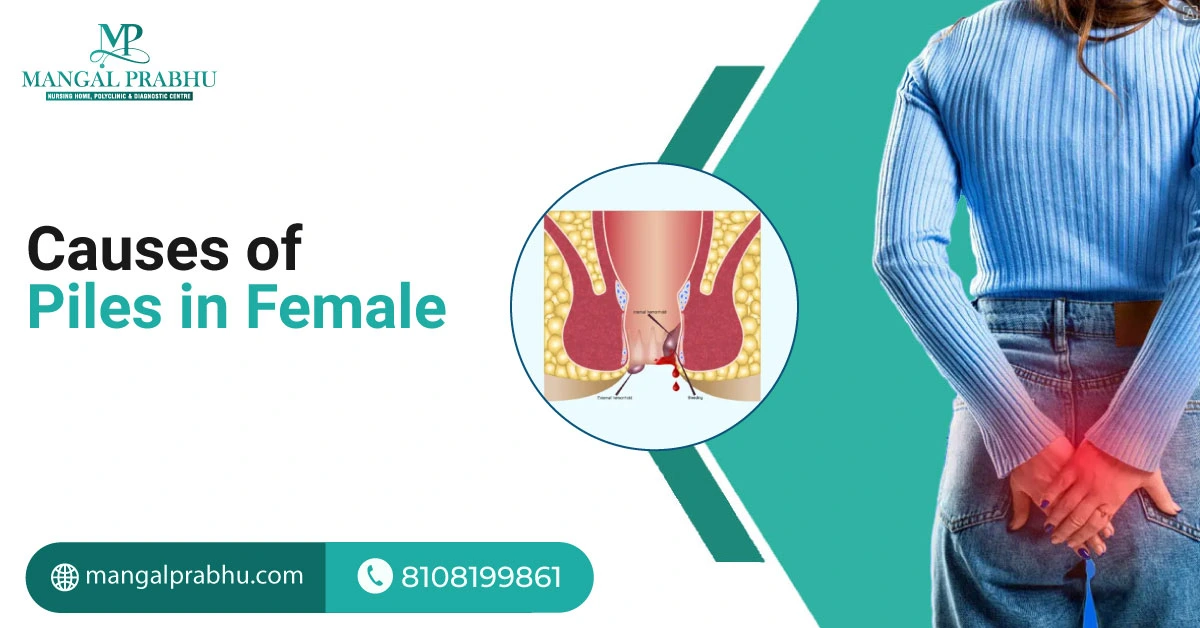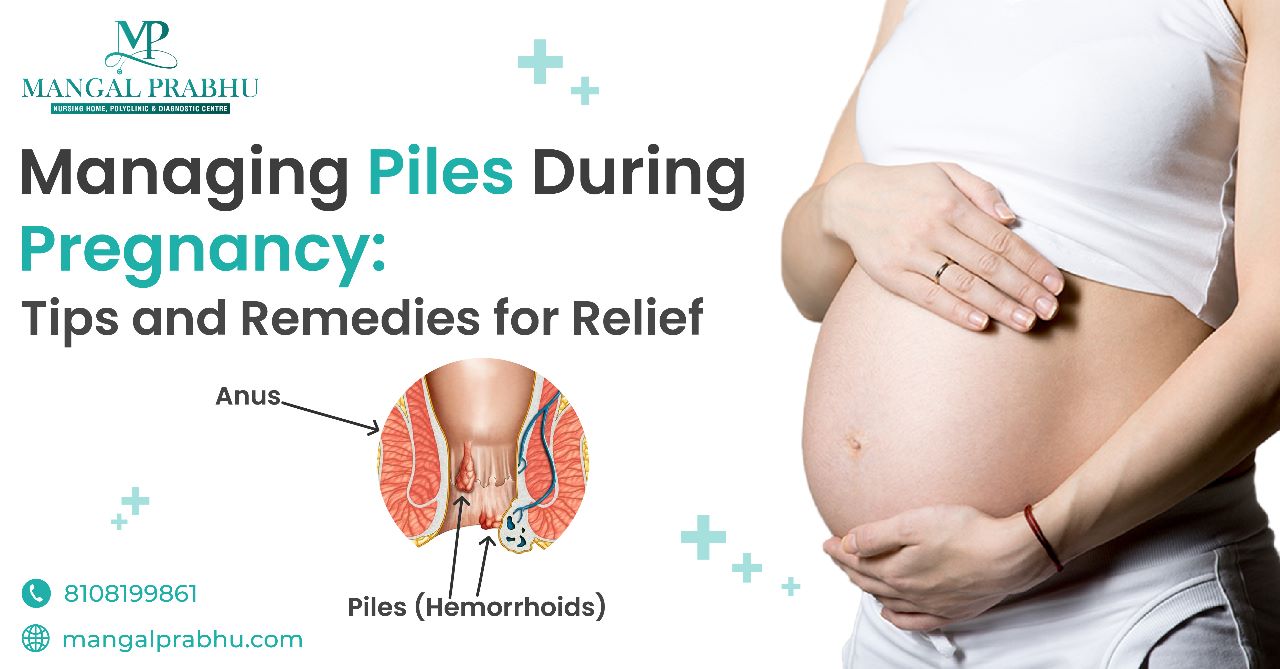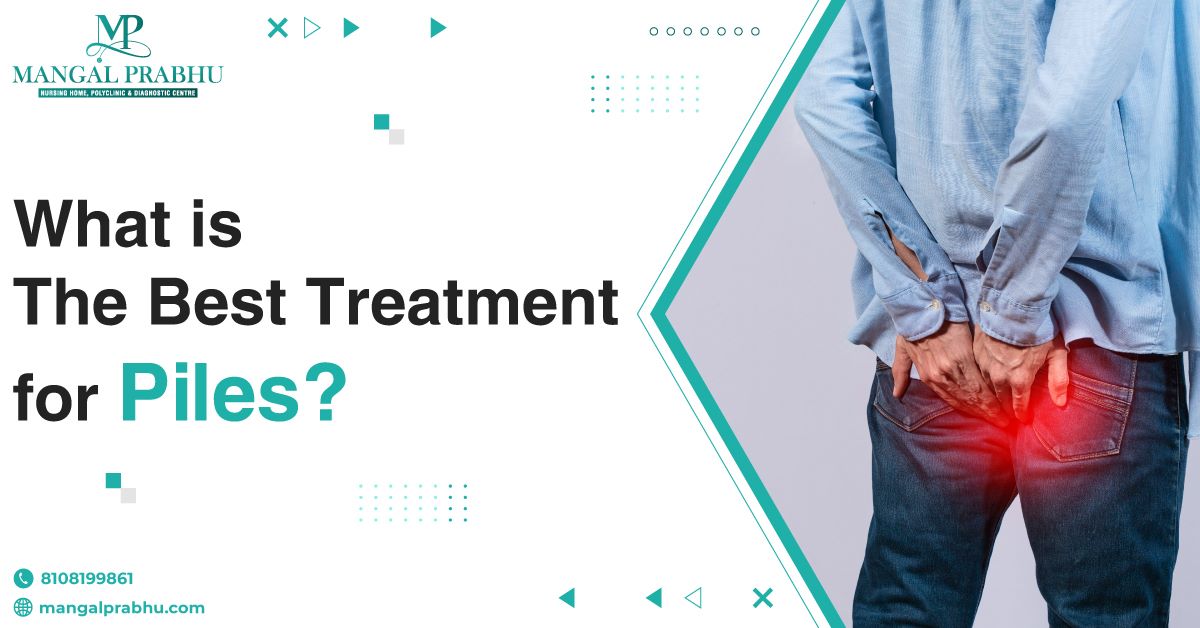
Causes of Piles in Female
Hemorrhoids, also called piles, occur when the veins in your anus or the lower rectum enlarge and become swollen. Piles are painful and can cause itching and sometimes bleeding. A piles specialist doctor in Navi Mumbai will recommend medication, minimally-invasive procedures, and sometimes surgery to ease your symptoms.
In this post, we’ll take a look at the common causes of piles in women.
Common Causes of Piles in Females
a) Pregnancy and Childbirth
Many factors can lead to piles in females during pregnancy and childbirth. For starters, hormonal fluctuations cause your vein walls to relax, which may heighten the risk of piles.
Additionally, as the mother approaches the third trimester, the growing uterus puts pressure on the pelvic region, enlarging the veins. This combined with the slower blood flow to the rectal area can result in the formation of piles during pregnancy. Women may also develop piles during childbirth, as the act of straining can trigger them.
b) Hormonal Changes
A woman undergoes significant hormonal changes during menstrual cycles, pregnancy, and menopause. These hormonal shifts can affect your dietary changes, which might lead to constipation, triggering hemorrhoids.
c) Dietary Factors
If your diet doesn’t contain sufficient amounts of fiber or is mainly composed of processed foods, you might experience hard stools. Excessive strain on the rectal veins can make you more likely to develop piles.
Lifestyle Factors Contributing to Piles
i) Sedentary Lifestyle:
If your job involves prolonged sitting or you live an inactive lifestyle, you might be more prone to developing piles than others. That happens because of reduced blood flow to the rectal area, leading to enlarged veins.
ii) Obesity:
Overweight people or those falling into the obese category are also at an increased risk of piles. The more you weigh, the higher the pressure on the pelvic region. This affects blood circulation, which may eventually result in piles.
Preventative Measures
Visit a hospital for piles treatment in Navi Mumbai to determine the most appropriate treatment plan for your case. Piles in women that occur due to temporary hormonal shifts, such as during pregnancy and childbirth, are likely to resolve on their own. Still, you must take certain preventative measures to reduce your likelihood of getting piles.
1) Dietary Adjustments:
The single most common reason for piles is excess pressure on the anal canal, which occurs when you strain excessively and frequently. To avoid that, eat a diet rich in fiber. Whole grains, green leafy vegetables, and fruits are the best examples.
2) Regular Physical Activity:
Exercise helps prevent hemorrhoids by improving blood flow to the rectal area, strengthening pelvic floor muscles, and keeping weight in check. It controls most factors that might contribute to a heightened risk of piles in females.
3) Drink Enough Water:
Aim to drink 8-10 glasses of water a day to keep the stool consistency soft. Hydration makes stool easily passable, reducing the risk of constipation and piles.
Conclusion
Although both men and women can develop piles, hormonal changes (particularly during pregnancy) make women more prone to developing them. Understanding the causes of piles in females can help you take preventative measures and reduce the risk.

Is It Possible To Do Piles Treatment Without Surgery?
Piles can be a painful and uncomfortable condition affecting millions worldwide. Traditionally, surgical procedures have been the go-to option for treating piles. However, advancements in medical science have paved the way for non-surgical piles treatment options. Here, you will explore the possibilities of non-surgical treatment options. You’ll find this information valuable if you’re seeking Piles Treatment in Navi Mumbai.
What is Piles?
Piles, or hemorrhoids, are swollen blood vessels in the rectum or anus. They can be internal, occurring inside the rectum, or external, developing under the skin around the anus. Piles can be incredibly painful and lead to discomfort, bleeding, and itching. There are various causes behind the development of piles, making them a common health concern.
Causes and Symptoms of Piles
Several factors contribute to the development of piles, including chronic constipation, straining during bowel movements, pregnancy, obesity, and a sedentary lifestyle. Individuals with a family history of piles are also at an increased risk.
The symptoms of piles can vary from person to person, but common signs include:
- Rectal bleeding on toilet paper or in the toilet bowl after a bowel movement.
- Itching and irritation around the anus.
- Pain and discomfort during bowel movements.
- Swelling and lumps near the anus.
- Mucus discharge from the anus.
Non-Surgical Piles Treatment Options
Fortunately, surgery is not the only option for piles treatment. Non-surgical approaches have gained popularity due to their effectiveness and minimal invasiveness. Some of the non-surgical treatment options available include:
A) Medications
Over-the-counter creams and ointments can help relieve itching and pain associated with piles. A piles doctor in Navi Mumbai can prescribe prescription medication to reduce inflammation and discomfort.
B) Sclerotherapy
It involves injecting a chemical solution into the blood vessels around the piles, causing them to shrink and eventually disappear.
C) Rubber Band Ligation
In this procedure, a small rubber band is placed at the base of the pile, cutting off its blood supply. It causes the pile to shrink and fall off.
D) Infrared Coagulation (IRC)
IRC uses heat to shrink the blood vessels within the piles, reducing their size and relieving symptoms.
E) Laser Therapy
Laser treatment can precisely target and shrink piles, offering quick relief without surgery.
The Benefits of Non-Surgical Piles Treatment
Non-surgical piles treatment options offer several advantages over traditional surgical procedures:
- Minimal Pain
Non-surgical treatments are generally less painful, with shorter recovery times than surgery.
- Outpatient Procedures
Many non-surgical treatments can be performed on an outpatient basis, allowing patients to return home the same day.
- Lower Risk of Complications
Surgical procedures, such as infection and bleeding, carry certain risks. Non-surgical treatments have a lower risk of complications.
- Faster Recovery
Non-surgical treatments typically have quicker recovery times, allowing patients to resume their normal activities sooner.
Conclusion
Piles can be a source of immense discomfort, but it’s reassuring to know that surgery is not the only option for treatment. Non-surgical piles treatment options offer effective alternatives with fewer risks and a quicker recovery. If you’re in Navi Mumbai and seeking treatment for piles, consider consulting a piles doctor at Mangal Prabhu Hospital. At this hospital, you can explore various non-surgical options and find relief from this troublesome condition. Remember, early intervention and proper treatment can significantly improve your quality of life and prevent the condition from worsening.

Managing Piles During Pregnancy: Tips and Remedies for Relief
Pregnancy is the most critical phase of every woman’s life, but it can also become complicated when an individual suffers from other issues. More than 2 percent of pregnant women suffer from piles of hemorrhoids for various reasons. However, treating this issue is very important as it can cause severe complications if left untreated. So if you are also looking for the best piles treatment hospital in Navi Mumbai, you must visit Mangal Prabhu Hospital to get the best treatment for piles or other issues during pregnancy.
Understanding Piles and Their Prevalence in Pregnancy
Piles or hemorrhoids are common health conditions that can cause severe complications in an adult if treated incorrectly. It is a common issue for pregnant women that causes various complications such as pain, bleeding, itching, and fullness in the rectum. Piles are usually swollen veins in the rectum and anus that happen for multiple reasons. Piles during pregnancy can be caused due to increased pressure on the pelvic area, constipation, hormonal imbalance, etc., leading to inflamed and enlarged veins in the bowel area.
Identifying the Symptoms of Piles During Pregnancy
Piles are a critical health condition that can obstruct the body’s overall functioning. This issue can worsen during pregnancy, and its symptoms can also differ from mild to severe piles. However, some of the common symptoms of piles during pregnancy are:
- Lumps around the anus
- Bleeding
- Pain
- Itching, swelling, or soreness around the anus
- The feeling of fullness in bowel movement
Also Read: What Is The Best Treatment For Piles?
Factors Contributing to Piles During Pregnancy:
Piles are an unpleasant issue caused when pressure bears down the lowest part of the digestive system or pelvic area. The pressure on the pelvic region is so heavy that the veins in the rectum and anus become inflamed and sometimes start bleeding after bowel movement. It can be caused due to various reasons, such as:
- Constipation
- Pressure of fetus
- Increase blood volume
- Lifting heavy objects
- Being obese or overweight
- Diarrhea
- Standing or sitting for an extended period
- Smoking
- Using too much steroid or other medication
- Drinking alcohol
Seeking Professional Help: When to Consult a Doctor
When you experience bleeding or other piles of piles during pregnancy, it would be best to consult the best Piles Treatment Doctor in Navi Mumbai to get an immediate and best treatment plan to overcome this issue. Experts doctors at Mangal Prabhu Hospital quickly diagnose the piles’ cause and offer a comprehensive treatment option to get through all the symptoms of piles and prevent other complications related to hemorrhoids.
Managing Piles Naturally: Home Remedies and Self-Care
Doctors offer the best treatment of piles during pregnancy, but they can also be treated with home remedies and self-care. However, some of the best home remedies to manage piles during pregnancy and relieve its symptoms are given below:
- Drinking plenty of water and other fluids
- Eat high-fiber diet
- Using sitz bath
- Exercise that improves circulation and reduces constipation
- Use over-the-counter medicines
- Applying cold compress
Conclusion
Pregnancy sometimes causes piles due to pressure on the lower part of the body or constipation. However, it can easily be managed with the help of proper home care tips to prevent future complications. However, it would be best to consult with the doctor to avoid future complications.

What Is the Best Treatment for Piles?
Introduction to Piles
Nearly three out of four adults suffer from piles. It can cause discomfort, pain, itching, and bleeding. Hence, it is essential to seek appropriate treatment. Generally, piles, or hemorrhoids, are swollen blood vessels in the rectal and anal areas. They can be internal, occurring inside the rectum, or external, forming under the skin around the anus. Here, you can explore the causes, symptoms, and Piles Treatment Hospital in Navi Mumbai. You can also learn about thediagnosing methods, treatment options, and prevention tips for piles.
Causes of Piles
Several factors contribute to the development of piles, including:
- Chronic constipation and straining during bowel movements are common causes.
- Prolonged sitting or standing, obesity, pregnancy, and a sedentary lifestyle can also increase the risk.
- Additionally, a family history of piles and aging are known risk factors.
Symptoms of Piles
The symptoms of piles can vary depending on their type and severity. Internal piles may cause painless bleeding during bowel movements, while external piles can lead to pain, swelling, itching, and discomfort. In some cases, blood clots may form in external piles, causing a painful condition called thrombosed hemorrhoids. However, you must see a Piles Doctor in Navi Mumbai if you find any symptoms.
Diagnosing Piles
At Mangal Prabhu Hospital, a medical professional physically examines the anal area to diagnose piles. It usually involves a visual inspection, but sometimes needs a digital rectal examination to assess the rectum. In some cases, doctors recommend additional diagnostic procedures like sigmoidoscopy or colonoscopy to rule out other potential causes.
Also Read: Understanding The Different Types Of Surgeries: A Guide For Patients
Treatment Options for Piles
The piles’ treatment aims to alleviate symptoms, reduce swelling, and promote healing. You can receive the following treatment approach for piles at Mangal Prabhu Hospital:
i) Lifestyle Modifications
Making changes to your lifestyle can help manage and prevent piles. These include maintaining a high-fiber diet, drinking plenty of water, exercising regularly, and avoiding prolonged sitting or standing.
ii) Topical Medications
Over-the-counter creams, ointments, or suppositories containing ingredients such as hydrocortisone, witch hazel, or lidocaine can temporarily relieve pain, itching, and inflammation.
iii) Oral Medications
Doctors may recommend pain relievers, such as nonsteroidal anti-inflammatory drugs (NSAIDs), to reduce pain and inflammation.
Prevention Tips for Piles:
Here are some preventive measures for the occurrence or recurrence of piles, including:
1. Maintain a High-Fiber Diet
A diet rich in fiber helps soften the stool, making it easier to pass without straining. Include fruits, vegetables, whole grains, and legumes daily.
2. Stay Hydrated
Drink adequate water throughout the day to keep stools soft and prevent constipation.
3. Regular Exercise
Engage in regular physical activity to promote healthy bowel movements and improve circulation.
4. Avoid Straining
Do not strain during bowel movements. Use a stool softener or try a different position, such as squatting, to make the process easier.
Conclusion
The treatment of piles depends on the severity of the condition and the individual’s specific circumstances. Lifestyle modifications, like dietary changes, are crucial in preventing and managing piles. You must consult a healthcare professional for an accurate diagnosis and personalized treatment plan for piles. Individuals can effectively manage piles and improve their quality of life by following the appropriate treatment options and preventive measures.
